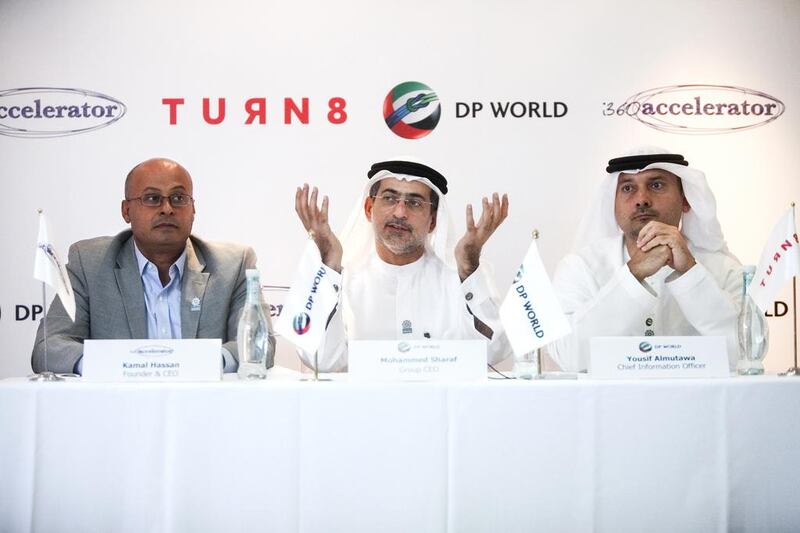Two initiatives changed the UAE entrepreneurial landscape this year in the start-up accelerator Turn 8 and the crowd-investing platform Eureeca – as the Emirates continued to pursue its goal of diversifying the economy away from oil and gas over the next 15 years and of becoming a global hub for innovation.
On first reflection, DP World’s announcement in April that it was launching a seed accelerator programme for business start-ups seemed somewhat unorthodox for a ports’ operator. But as the chief information officer Yousif Al Mutawa pointed out, DP World has a track record of embracing innovation. The company wanted to support the refocusing of entrepreneurship here away from tourism and property and towards tech and knowledge creation, he said.
Dubai’s only commercial accelerator, i360, was drafted in to run the programme, as DP World decided it should operate as a stand-alone entity without a corporate behemoth looking over its shoulder.
After sifting through 400 ideas, Turn 8 welcomed eight international teams from Egypt, Belarus and Ukraine to join one team from Dubai in the first intake of entrepreneurs.
Participants were given office space, mentoring and access to US$24,000 to advance their ideas.
By September, the teams were developing ideas that included technology to help consumers to figure out whether products such as medicine or car parts are genuine, and software to translate sign language into audible words.
Asly, a company that is developing technology to ascertain whether products – such as medicines or car parts are genuine – has attracted favourable attention from a “super angel investor”, Dave McClure, the founder of the Silicon Valley accelerator 500 Startups, when he visited the UAE last month.
As the year drew to an end, Turn 8 was accepting applications from teams hoping to take part in the second round of the programme.
A perennial complaint from start-ups here is that it remains difficult to get funding – either from banks or investors or by selling shares publicly – to grow. So in May, Chris Thomas and Sam Quawasmi, two former investment bankers based in Dubai, launched Eureeca, a crowd-investing platform, to help to plug this funding gap.
Impressively, the pair got Nasser Saidi, a former Lebanese economy minister and central bank governor on board as deputy chairman.
The platform generated a fair amount of excitement among regional watchers of small and medium enterprises (SMEs) after Nabbesh, one of the first companies to seek financing via Eureeca, reached its $100,000 funding goal in just 12 days. Nabbesh, however, has a head start, with a higher profile than many start-ups after winning du’s reality TV competition The Entrepreneur.
Eureeca itself finished the year on a high note by scooping start-up of the year at the Arabian Business StartUp Awards.
SMEs also received a boost in June after the Federal National Council passed a law stating that federal authorities must spend at least 10 per cent of their procurement budgets with small businesses. The law is now awaiting the President’s approval.
Meanwhile the 2013 recovery in the property, commerce and transport sectors combined with the prospect of hosting Expo 2020 sent sentiment soaring among Dubai’s business owners.
The Business Leaders’ Survey for the fourth quarter of the year, conducted by the Dubai Chamber of Commerce, revealed that the business outlook was the most positive in the organisation’s history.
Leaders also said they expected an improvement in business confidence in the final quarter of this year. Larger businesses were more optimistic than smaller businesses, with 82 per cent of them expecting better business conditions and 65 per cent expecting improved business confidence. The figures were 78 per cent and 61 per cent respectively for SMEs.
The chamber also launched its own initiative in May to address the funding gap for SMEs, launching Tejer Dubai as part of its Entrepreneur Development Programme.
Under the plan, the founders of new businesses are mentored by veteran entrepreneurs as they transform their ideas into viable commercial entities.
When new businesses embark on the search for funding, they will appear before a panel of banking executives – including the chief executive of HSBC Middle East – in the hope that by securing the panel’s endorsement of the business plan, finance will be easier to come by.
Finally, for those interested in entrepreneurship in the Middle East Startup Rising by the American entrepreneur and investor Christopher Schroeder is the top read.
He set out to discover whether the Middle East had the potential to create its own Silicon Valley by visiting and interviewing entrepreneurs in Egypt, Jordan, Lebanon, Dubai and Saudi Arabia.
Watch this space.
lgutcher@thenational.ae





